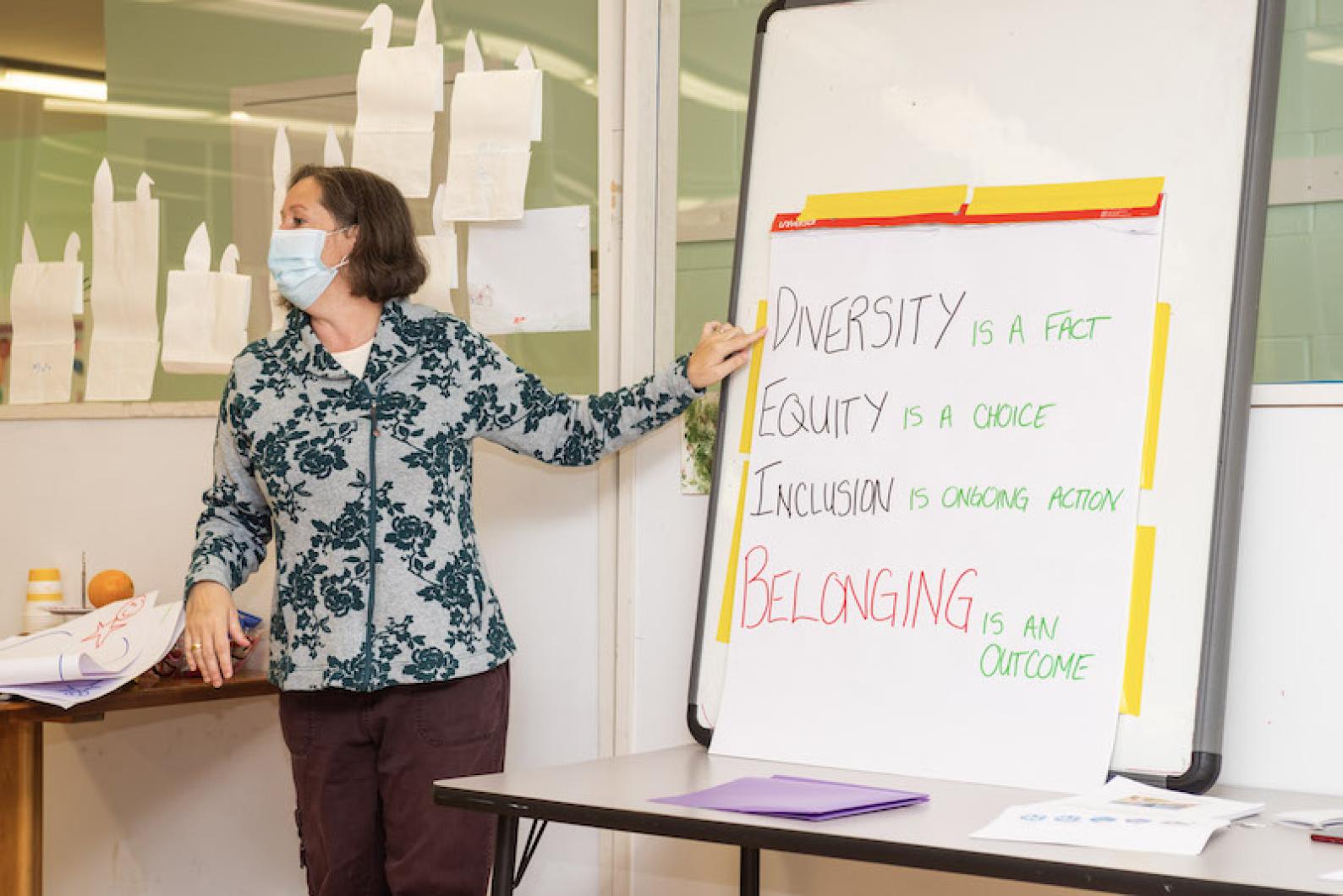Eight Martha’s Vineyard nonprofits, including the Edgartown Library, the Boys & Girls Club, the YMCA and Island Grown Initiative, are getting ready for a season of unprecedented challenges as the Island reopens and children return to camp and other summer activities.
“We’re going to be seeing higher social and emotional needs than ever before,” said inclusion consultant Kat King, who is in her second year of training the groups’ staffers in practices that welcome people of all abilities.
Ms. King, who is based in Raleigh, N.C., was on the Vineyard last week and conducted a training session Friday morning at the Boys & Girls Club in Edgartown.
While her work is largely focused on people — especially the young — with disabilities, Ms. King told club staff that all children are likely to have additional needs after more than a year of the pandemic.
What might seem at first like attention-seeking behavior may well mask the need to make human connections after long isolation, she said.
“They’ve been home so much,” Ms. King said. “That craving for connection is going to be a challenge for you.
“It’s not a disability, but it is something we need to work hard on,” she told the staffers, several of whom nodded in agreement.
And children are not the only ones to suffer trauma during the pandemic, said Ms. King, who returns to the Vineyard in late June to train the combined staffs of the Boys & Girls Club and YMCA summer camps.
“We’ll be focusing on inclusion, supporting positive behavior and trauma-informed care . . . using the lens of trauma in supporting all campers and staff,” she told the Gazette during a break from Friday’s training at the club.
The training will show camp staffers how to recognize when both their charges and their fellow workers may have additional needs this summer, she said.
The joint training is not an economy, but a synergy suggested by the two organizations themselves, according to Julie Lively, resource director for the Island Disability Coalition.
“They could not have been more enthusiastic to connect and partner together . . . to basically collaborate to provide the best experience for all the kids, rather than be in competition,” she said.
That kind of collaboration is exactly what the disability coalition seeks to foster as it works to develop a fully inclusive Island, Ms. Lively said.
“It’s evolving in just a beautiful, organic way.”
The coalition hired Ms. King with the help of grant funding from the Tower Foundation and the Family Support Center at Martha’s Vineyard Community Services, Ms. Lively said.
After an initial year of web-based consultations and trainings with local nonprofits, the coalition asked the groups to submit grant applications for training with Ms. King this year.
“We didn’t know if anybody would even respond, quite frankly,” Ms. Lively said.
Instead, the coalition received a flood of proposals aimed at opening up the groups’ facilities to people of all abilities.
“It was very cool that even though so many organizations were shut down to the public, there was so much going on behind the scenes for programming,” Ms. Lively said.
“We were able to fund, not absolutely everything, but a really solid chunk of what the organizations were requesting.”
Along with the summer camp training, other Island projects on Ms. King’s list include full access for the outdoor areas at the Edgartown Library and a revamped play area and all-accessible trail at Felix Neck.
“Someone coined the phrase, ‘we’re not just rebooting, we’re reimagining,’” Ms. Lively said.
But inclusion is not the ultimate goal, Ms. King told the Boys & Girls Club group on Friday.
“Inclusion is ongoing action for those everyday little things,” she said.
Inclusion includes making sure everyone can participate in activities, so that no one is sidelined, Ms. King said. But it doesn’t mean that everyone has to participate the same way: A child can lead the cheers at a race or game, instead of running or playing.
“You don’t need to participate 100 per cent the same way to feel 100 per cent included,” she said.
The ultimate outcome of inclusion, Ms. King said, is belonging — a community in which diversity is celebrated and encouraged.
“This is an environment where being different is great,” she said.
The Island Disability Coalition recently launched a new website with more details about the nonprofits currently working with Ms. King, as well as other information about coalition projects and opportunities: https://idcmvy.org/.






Comments
Comment policy »